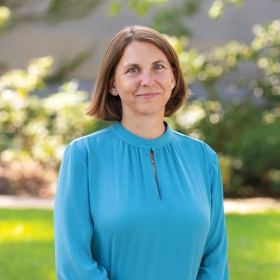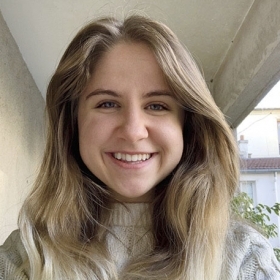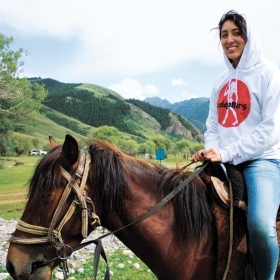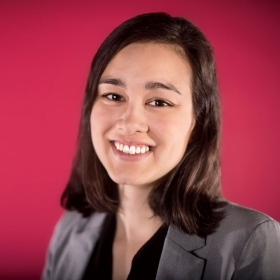Jennifer Thomas-Starck
The Office of International Study was among the first departments to feel the effects of the pandemic directly. They responded with innovative approaches to creating overseas experiences for students.

Photo by Lisa Abitbol
The Office of International Study was among the first departments to feel the effects of the pandemic directly. First, in January 2020, new arrangements were made for students who had planned to go to China. Then, several students in Korea were brought home. Next, students in Italy were called back, and soon after, the College recommended that everyone come home. “It was a 24-hour-a-day operation,” remembers Jennifer Thomas-Starck, director of international study.
In June, the College announced its plan to have about half of the student body in person on campus for the 2020–21 academic year and half studying remotely. At that point, Thomas-Starck and her colleagues began trying to create safe study abroad options. “The idea was, maybe we can give our students a shot at an in-person semester, even though it’ll be a different kind of study abroad experience,” Thomas-Starck says. A team met weekly to track the trajectory of the virus around the world, the availability of health care, and visa requirements. “Then we started working with our partners abroad asking, if you were to have students there, what does that look like? What protocols do you have in place?”
In the end, 44 students participated in “traditional” study abroad programs for the fall, spring, or academic year in the Czech Republic, Denmark, France, Germany, Greece, Iceland, Ireland, New Zealand, Rwanda, South Korea, Spain, Switzerland, and the U.K.
The Office of International Study also invented more than a dozen new seven-week study abroad programs to align with the College’s term system that academic year. In all, 193 students participated in term 2 and term 4 programs in Denmark, England, Germany, Greece, Italy, Jordan, South Korea, and Spain. Not all programs were able to run; one group’s trip to France was canceled the day before their flight because the country went into national lockdown. Still, says Thomas-Starck, “I’m quite confident that Wellesley had more students studying abroad than any other U.S. college or university.”
Thomas-Starck praises students’ flexibility. Many shifted their plans multiple times, and programs often changed while the students were abroad.
One group of eight in Italy was moved from Perugia to Florence at the last minute, because the Tuscany area was doing better at the time. They planned to quarantine for two weeks, and then have in-person classes for five. “Well, the day before they got out of quarantine, Tuscany went into the red zone. … Any hope of having in-person classes for the next month was squashed,” Thomas-Starck says. They gave the students the option to come home; two did, but six of them stayed. “They went grocery shopping every single day and took the long way out to get their COVID test,” she says. “I think they were just happy to be together, living in community.” Italy opened up again at the end of their stay. They were able to go to Rome, and then enjoyed exploring Florence without other tourists.
Of the 83 students who were in Greece during term 4, about half were first-years, some of whom hadn’t even been on campus yet. “Overall, it went really well, particularly for the first-year students. A light bulb went on, as well,” Thomas-Starck says. Why did Wellesley normally just send juniors to study abroad? There were a lot of reasons why it made sense to send the first-years. They’re not focused on major requirements yet, and for some, studying abroad is a good transition to college life, similar to a gap year. And the students very much appreciated being part of a cohort of Wellesleys.
The program went so well that this year, the College launched the First-Year Global Scholars Program in Greece, in collaboration with longtime partner College Year in Athens (founded by Ismene Phylactopoulou, Wellesley class of 1922). Fifteen first-years participated in the inaugural program during the fall semester, which included a networking event with local alumnae in October.
Usually, colleges are slow to change. But during the pandemic, says Thomas-Starck, “Everybody’s been innovating everywhere.”


